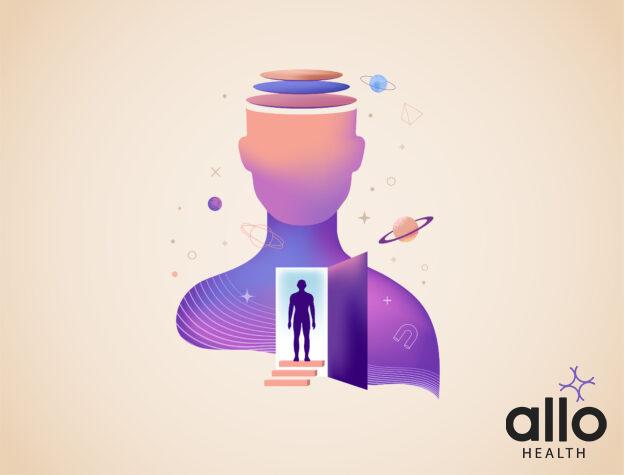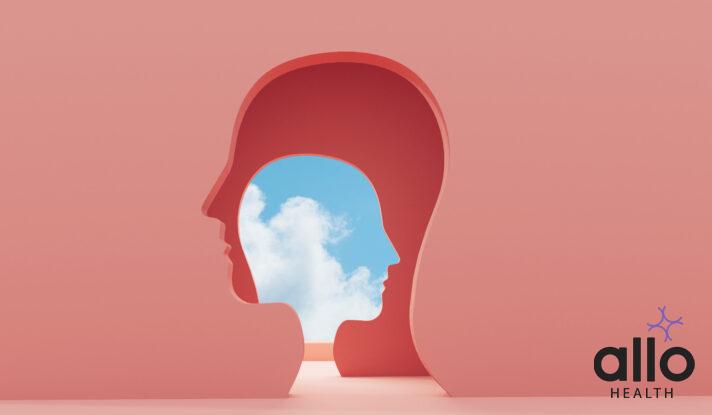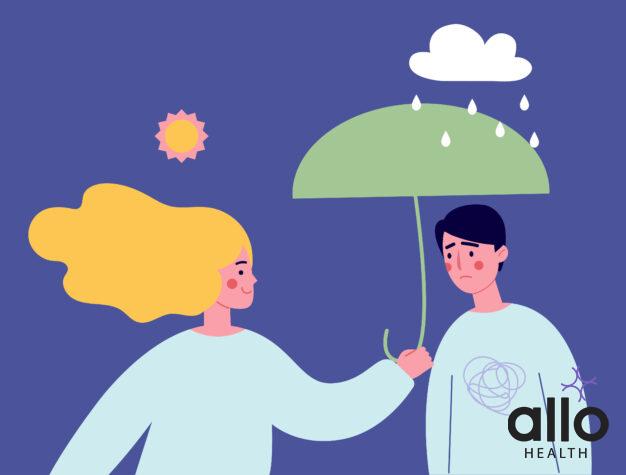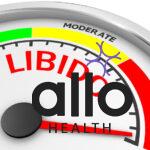How to Increase Libido While on Antidepressants: Tips and Strategies

Allo Health is dedicated to personalized well-being, offering support and trusted information tailored to individual health goals. The platform emphasizes human-generated content, led by a distinguished medical team of experts, including physicians and sexual health specialists. Their commitment to credibility involves rigorous fact-checking, authoritative research, and continuous updates to ensure accurate, up-to-date information. Allo Health's unique approach goes beyond conventional platforms, providing expert-led insights and a continuous commitment to excellence, with user feedback playing a crucial role in shaping the platform's authoritative voice.

Ms Miriam is a licensed Clinical Psychologist and Psychotherapist, who completed her training and licencing from the National Institute of Mental Health and Neurosciences (NIMHANS), and has experience in working with patients in areas of adult psychiatry, child and adolescent psychiatry, addiction medicine, neuropsychology and family & marital therapy.
Why This Was Upated?
Our experts continually monitor the health and wellness space, and we update our articles when new information became available.
Updated on 26 September, 2023
- Article was updated as part of our commitment to diversity, equity, and inclusion.

"The following blog article provides general information and insights on various topics. However, it is important to note that the information presented is not intended as professional advice in any specific field or area. The content of this blog is for general educational and informational purposes only.
Book consultation
The content should not be interpreted as endorsement, recommendation, or guarantee of any product, service, or information mentioned. Readers are solely responsible for the decisions and actions they take based on the information provided in this blog. It is essential to exercise individual judgment, critical thinking, and personal responsibility when applying or implementing any information or suggestions discussed in the blog."
If you are someone who is taking antidepressants, you may know that they can significantly impact sexual functioning. One of the common side effects of antidepressants is a low sex drive, which can be frustrating for those who want to maintain a healthy sexual relationship with their partners. If you’re on the pills then you may be wondering how to increase libido while on antidepressants?
Connection between Antidepressants and Libido
Antidepressants and libido are interconnected in complex ways, and the relationship between them can vary depending on the specific medication, individual factors, and the underlying condition being treated. While antidepressants are primarily prescribed to alleviate symptoms of depression, anxiety, and other mental health disorders, they can have effects on sexual desire and functioning, including libido.
- Mechanism of Action: Antidepressants work by altering the levels of neurotransmitters, such as serotonin, norepinephrine, and dopamine, in the brain. These neurotransmitters play a role in mood regulation, but they also have an impact on sexual desire and function.
- Selective Serotonin Reuptake Inhibitors (SSRIs): SSRIs are a class of antidepressants commonly prescribed for depression and anxiety disorders. They work by increasing the levels of serotonin in the brain. However, elevated serotonin levels can sometimes suppress sexual desire and interfere with arousal and orgasm. Reduced libido is one of the most frequently reported sexual side effects associated with SSRIs.
- Other Antidepressant Classes: Different classes of antidepressants may have varying effects on libido. For example, serotonin-norepinephrine reuptake inhibitors (SNRIs) like venlafaxine and duloxetine may have similar sexual side effects to SSRIs. Tricyclic antidepressants (TCAs) and monoamine oxidase inhibitors (MAOIs) may also affect libido, but they tend to have a broader range of side effects overall.
- Individual Differences: The impact of antidepressants on libido can vary widely between individuals. Some people may experience a significant decrease in sexual desire, while others may not notice any change or may even experience an improvement in their sexual function. Factors such as age, gender, overall health, and the presence of pre-existing sexual dysfunction can influence how antidepressants affect libido.
- Timing and Dosage: Sexual side effects from antidepressants are more likely to occur shortly after starting the medication or when the dosage is increased. In some cases, these side effects may diminish over time as the body adjusts to the medication. However, for some individuals, the sexual side effects may persist throughout the course of treatment.
- Treatment Strategies: If antidepressant-induced sexual side effects are significantly impacting an individual’s quality of life, several strategies can be considered. These may include:
- Switching medication: Sometimes, switching to a different antidepressant with a lower likelihood of sexual side effects may be an option.
- Dosage adjustment: Modifying the dosage of the current antidepressant can help alleviate sexual side effects while still providing therapeutic benefits.
- Supplemental medications: In certain cases, adding a medication like bupropion or a low-dose phosphodiesterase-5 inhibitor (e.g., sildenafil, tadalafil) can help manage antidepressant-induced sexual dysfunction.
- Psychotherapy: Working with a therapist or sex therapist can help address any psychological factors contributing to sexual dysfunction and explore alternative coping strategies.
- Open communication with the healthcare provider: It’s essential to discuss any sexual side effects with the prescribing healthcare professional to determine the best course of action.
It’s important to note that managing antidepressant-induced sexual side effects should always be done in consultation with a healthcare professional. They can provide personalized guidance and tailor the treatment approach to the individual’s specific needs and circumstances.
The Side Effects of Antidepressants on Sexual Functioning
Antidepressants can have various effects on sexual functioning, and these side effects can significantly impact an individual’s sexual desire, arousal, and satisfaction. Here are the key details about the potential sexual side effects of antidepressants:
- Reduced Libido (Hypoactive Sexual Desire Disorder): One of the most commonly reported sexual side effects of antidepressants is a decrease in sexual desire or libido. This can manifest as a reduced interest in sexual activity and a lack of spontaneous sexual thoughts or fantasies.
- Erectile Dysfunction and Impaired Arousal: Antidepressants can interfere with the physiological processes involved in achieving and maintaining an erection in men. This can result in difficulties with arousal, decreased erectile function, or even erectile dysfunction (the inability to achieve or sustain an erection sufficient for sexual intercourse).
- Delayed Ejaculation or Anorgasmia: Delayed ejaculation is a condition in which it takes a significantly longer time for a person to ejaculate or they may not be able to ejaculate at all. Anorgasmia refers to the inability to achieve orgasm, despite adequate sexual stimulation. Both of these conditions can be side effects of antidepressant use.
- Genital Anesthesia or Numbness: Some individuals may experience a decrease in genital sensitivity or a feeling of numbness in the genital area while taking antidepressants. This can interfere with sexual pleasure and make it more challenging to reach orgasm.
- Changes in Sexual Arousal Patterns: Antidepressants can alter the normal sexual arousal response, making it more difficult to become sexually aroused or experience the same level of pleasure or satisfaction during sexual activity.
- Changes in Sexual Function in Women: Women may experience similar sexual side effects to men, such as reduced libido, difficulty with arousal, and delayed orgasm. Additionally, antidepressants can sometimes cause vaginal dryness, making sexual intercourse uncomfortable or painful.
Not everyone will experience these sexual side effects, and the severity and impact can vary widely among individuals. Additionally, different antidepressants have different profiles regarding their impact on sexual functioning. For example, SSRIs, such as fluoxetine (Prozac) and sertraline (Zoloft), are more commonly associated with sexual side effects compared to other classes of antidepressants.
If sexual side effects are bothersome or significantly impact an individual’s quality of life, it is crucial to discuss them with a healthcare professional. They can provide guidance on potential strategies to manage these side effects, such as adjusting the medication dosage, switching to a different antidepressant, or considering adjunctive treatments to address the sexual dysfunction while still effectively managing the underlying mental health condition.
How To Increase Libido While On Antidepressants?
Discussing sexual side effects with your doctor can be uncomfortable, but it is crucial to communicate openly so that your healthcare provider can help you find the best possible solution. Here are some detailed steps on how to talk to your doctor about sexual side effects of antidepressants:
- Prepare in Advance: Before your appointment, take some time to gather your thoughts and make notes about your concerns. Think about the specific sexual side effects you have been experiencing, how long they have been occurring, and how they are affecting your overall well-being and quality of life.
- Choose the Right Time and Setting: Schedule a dedicated appointment with your doctor to discuss your concerns about sexual side effects. This ensures that you have sufficient time to talk without feeling rushed. Consider selecting a private setting where you feel comfortable discussing sensitive topics.
- Be Honest and Open: Approach the conversation with honesty and openness. Remember that sexual side effects are a common concern with antidepressants, and your doctor is there to help you find a solution. Be specific about the sexual symptoms you are experiencing and how they are impacting your sexual functioning and overall well-being.
- Use Clear and Descriptive Language: Use clear and descriptive language to explain your symptoms. This helps your doctor understand the severity and nature of the concern. For example, instead of simply saying you have “sexual concerns,” be specific about the changes in libido, difficulties with arousal or orgasm, or any other specific concerns you are facing.
- Provide Relevant Details: Provide your doctor with relevant information about your medication, including the name, dosage, and how long you have been taking it. Mention any changes you have noticed in your sexual functioning since starting the medication or any previous attempts to address the concern.
- Discuss the Importance of Sexual Health: Emphasize the significance of sexual health and its impact on your overall quality of life, relationships, and mental well-being. This helps your doctor understand the importance of finding a solution that addresses both your mental health needs and your sexual functioning.
- Ask about Alternatives: Inquire about alternative antidepressant options with potentially lower sexual side effects. Different antidepressants have varying profiles, so discussing alternative medications may be a valid option. Your doctor can guide you through the potential risks and benefits of switching medications.
- Explore Dose Adjustments: Ask about the possibility of adjusting the dosage of your current medication. Sometimes, lowering the dosage or titrating it to find the minimum effective dose can help alleviate sexual side effects while still maintaining the therapeutic benefits of the antidepressant.
- Inquire about Adjunctive Medications or Treatments: Discuss the potential use of supplemental medications or treatments to manage sexual side effects. For example, your doctor may consider adding medications like bupropion or low-dose phosphodiesterase-5 inhibitors to mitigate antidepressant-induced sexual dysfunction.
- Seek Referral to a Specialist: If necessary, ask for a referral to a specialist, such as a psychiatrist, urologist, or gynecologist, who has expertise in managing sexual side effects of antidepressants. These specialists can provide further guidance and explore additional treatment options.
Non-Medical Ways On How To Increase Libido While On Antidepressants
While it’s essential to consult with your healthcare provider regarding any changes to your treatment or medication regimen, there are several non-medical strategies that may help boost your libido while on antidepressants. These strategies focus on improving overall sexual well-being and addressing potential underlying factors contributing to decreased sexual desire. Here are some detailed approaches to consider:
- Open Communication: Talk openly and honestly with your partner about your sexual concerns and desires. Discussing your feelings and needs can help reduce anxiety and create a supportive and understanding environment.
- Address Underlying Stress and Anxiety: Stress and anxiety can impact sexual desire. Engage in stress-reducing activities such as exercise, mindfulness, meditation, or relaxation techniques to help manage these factors.
- Prioritize Self-Care: Taking care of your overall well-being can positively influence your sexual desire. Ensure you are getting adequate sleep, eating a balanced diet, staying hydrated, and engaging in activities that bring you joy and relaxation.
- Explore Sensate Focus: Sensate focus exercises involve gradually and sensually exploring your own or your partner’s body without the goal of sexual intercourse. This can help build intimacy and re-establish a connection with your own sensations and desires.
- Maintain a Healthy Lifestyle: Regular exercise can enhance blood flow and promote feelings of well-being, which can positively affect libido. Aim for at least 30 minutes of moderate-intensity exercise most days of the week. Additionally, avoiding excessive alcohol consumption and refraining from smoking may also benefit sexual health.
- Incorporate Sensual Activities: Engage in activities that promote sensuality and intimacy, such as giving and receiving massages, taking baths together, or engaging in prolonged foreplay. These activities can help build anticipation and increase arousal.
- Experiment with New Forms of Intimacy: Explore different types of sexual activities that focus on pleasure and intimacy beyond traditional intercourse. This may include exploring erogenous zones, incorporating sex toys or lubricants, or trying new positions or techniques.
- Seek Support from a Sex Therapist: Consider working with a sex therapist or counselor who specializes in sexual health. They can provide guidance, support, and techniques to address specific sexual concerns and help you navigate the impact of antidepressants on your libido.
- Manage Side Effects: Some individuals find that adjusting the timing of medication intake can help mitigate sexual side effects. For example, taking the medication at a time when sexual activity is less likely to occur, such as in the morning, might be beneficial for some individuals.
- Give it Time: Sexual side effects from antidepressants can be temporary for some individuals. It may take time for your body to adjust to the medication, and the sexual side effects might diminish or become more manageable over time.
The Role of Exercise in Increasing libido while on Antidepressants
Exercise can play a significant role in enhancing sexual drive, both in general and when taking antidepressant medication. Here are the details on how exercise can positively impact libido while on antidepressants:
- Improved Mood: Exercise has been shown to have mood-enhancing effects by increasing the release of endorphins, which are natural feel-good chemicals in the brain. This mood improvement can help counteract the potential negative impact of antidepressants on sexual desire and drive.
- Reduced Anxiety and Stress: Regular physical activity can help reduce anxiety and stress levels, which are common contributors to decreased libido. By engaging in exercise, you can release tension, boost relaxation, and experience an overall reduction in anxiety, thus promoting a more positive sexual mindset.
- Increased Blood Flow: Exercise improves cardiovascular health and increases blood flow throughout the body, including to the genital region. Enhanced blood circulation can promote arousal, stimulate sexual sensations, and support healthy sexual functioning.
- Enhanced Body Image and Self-Confidence: Regular exercise can improve body image and self-confidence, which are important factors in sexual desire and satisfaction. Feeling good about your body and having confidence in your physical abilities can positively impact your sexual self-esteem and drive.
- Hormonal Balance: Exercise can influence hormone levels, including the release of endorphins, dopamine, and testosterone. These hormones play crucial roles in sexual desire and arousal. Regular exercise can help maintain hormonal balance, which can contribute to a healthy libido.
- Increased Energy and Stamina: Regular physical activity can boost overall energy levels and physical stamina. Improved energy and stamina can translate into enhanced sexual performance and a greater desire for sexual activity.
- Improved Body Awareness: Engaging in exercises that promote body awareness, such as yoga or Pilates, can help you become more attuned to your body and its sensations. This increased body awareness can heighten sexual sensations and pleasure.
- Positive Impact on Body Weight: Regular exercise can help maintain a healthy body weight or support weight loss efforts, if needed. Achieving or maintaining a healthy weight can positively affect body image, self-confidence, and sexual desire.
- Increased Intimacy: Exercise can be a shared activity between partners, fostering a sense of closeness and intimacy. Engaging in physical activities together can strengthen emotional bonds and improve communication, which can positively influence sexual desire and satisfaction.
The impact of exercise on libido can vary between individuals, and the specific effects may depend on factors such as the type, duration, and intensity of exercise. Finding an exercise routine that you enjoy and can commit to regularly is key.
Always consult with your healthcare provider before starting or modifying any exercise regimen, especially if you have any underlying health conditions or concerns. They can provide personalized advice and ensure that exercise is safe and appropriate for your specific situation.
The Impact of Stress and Anxiety on Libido while Taking Antidepressants
Stress and anxiety can have a significant impact on libido, and when combined with the effects of antidepressant medication, they can further contribute to a decrease in sexual desire. Here are the details on how stress and anxiety can affect libido while taking antidepressants:
- Psychological Factors: Stress and anxiety can create a mental burden that distracts from sexual desire and pleasure. When your mind is preoccupied with worries, it can be challenging to fully engage in and enjoy sexual experiences.
- Physiological Response: Stress and anxiety trigger the body’s “fight-or-flight” response, leading to the release of stress hormones such as cortisol and adrenaline. These hormones can interfere with the normal functioning of the reproductive system, potentially decreasing sexual desire and arousal.
- Altered Mood: Chronic stress and anxiety can contribute to feelings of depression or low mood. Antidepressant medication aims to alleviate these symptoms, but they can also affect sexual desire as a side effect. The combination of stress, anxiety, and antidepressants may further impact mood, leading to a decrease in libido.
- Fatigue and Lack of Energy: Prolonged stress and anxiety can result in fatigue and a lack of energy, which can dampen sexual desire and affect sexual performance. Antidepressants can also contribute to fatigue as a side effect, compounding the impact on libido.
- Body Image and Self-Esteem: Stress and anxiety can negatively affect body image and self-esteem, which can undermine sexual confidence and desire. The combination of psychological distress and the potential weight-related side effects of antidepressants may further contribute to body image concerns.
- Relationship concerns: Stress and anxiety can strain relationships, leading to communication difficulties, decreased intimacy, and a lack of emotional connection. These relationship concerns can directly impact sexual desire and satisfaction.
Addressing the Impact of Stress and Anxiety on Libido:
- Stress Management Techniques: Engage in stress reduction techniques such as mindfulness meditation, deep breathing exercises, progressive muscle relaxation, or engaging in activities you find relaxing and enjoyable. These practices can help reduce stress levels and improve overall well-being.
- Cognitive Behavioral Therapy (CBT): Consider therapy sessions focused on managing stress, anxiety, and negative thought patterns. CBT can provide coping strategies to reframe negative thoughts and reduce the impact of stress on sexual desire.
- Open Communication: Discuss your stress and anxiety with your partner, as open communication can foster understanding and support. Working together to create a safe and supportive environment can help alleviate stress-related barriers to sexual desire.
- Prioritize Self-Care: Take care of yourself by getting sufficient sleep, eating a balanced diet, and engaging in activities that bring you joy and relaxation. Self-care practices can help reduce stress levels and promote a positive mindset, which may positively impact libido.
- Supportive Relationships: Seek support from friends, family, or a therapist to help manage stress and anxiety. Developing strong support networks can provide emotional support and alleviate the burden of stress.
- Adjust Medication: If stress and anxiety are severely impacting your libido, consult with your healthcare provider about adjusting the dosage or exploring alternative antidepressant options that have a lower likelihood of sexual side effects.
Remember, everyone’s experience with stress, anxiety, and the impact on libido can vary. It’s crucial to communicate openly with your healthcare provider about your concerns to ensure that appropriate support and treatment options are explored.
Coping Strategies for Low Sex Drive While on Antidepressants

Experiencing a low sex drive while on antidepressants can be frustrating, but there are coping strategies that can help you manage this side effect. It’s important to discuss these strategies with your healthcare provider to ensure they are appropriate for your specific situation. Here are some detailed coping strategies for low sex drive while on antidepressants:
- Open Communication: Talk openly with your partner about your decreased sex drive and the impact it has on your relationship. Sharing your feelings, concerns, and desires can foster understanding and support.
- Educate Yourself: Learn about the potential sexual side effects of the specific antidepressant you’re taking. Understanding that low sex drive can be a common side effect of these medications can help alleviate feelings of guilt or frustration.
- Manage Stress and Anxiety: Stress and anxiety can further contribute to low sex drive. Engage in stress reduction techniques, such as mindfulness, relaxation exercises, or therapy, to help manage these factors and create a more conducive environment for sexual desire.
- Explore Non-Sexual Intimacy: Focus on non-sexual forms of intimacy, such as cuddling, hugging, holding hands, or engaging in activities that promote emotional connection and closeness. This can help maintain intimacy and strengthen your relationship, even if sexual desire is temporarily lower.
- Prioritize Emotional Connection: Emphasize emotional intimacy in your relationship. Engage in activities that promote deep conversations, quality time together, and bonding experiences. A strong emotional connection can foster a sense of closeness and increase overall relationship satisfaction.
- Experiment with Timing: Talk to your healthcare provider about the possibility of adjusting the timing of your medication. Taking the antidepressant at a different time of day might minimize its impact on sexual desire and allow for more enjoyable sexual experiences.
- Explore Sensate Focus Exercises: Sensate focus exercises involve focusing on sensual touch without the pressure of sexual performance or orgasm. These exercises can help increase comfort, pleasure, and intimacy, allowing you to reconnect with your body and potentially improve sexual desire over time.
- Engage in Self-Care: Prioritize self-care activities that promote relaxation, stress reduction, and overall well-being. This can include activities such as exercise, hobbies, time alone, or pampering yourself. Taking care of your own needs can positively impact your mood and potentially enhance sexual desire.
- Discuss Medication Options: If the low sex drive is significantly impacting your quality of life, consult with your healthcare provider about potential alternative medications or adjustments to your current dosage. They can assess the potential benefits and risks of changing your medication regimen.
- Seek Support: Consider seeking support from a therapist or counselor who specializes in sexual health or couples therapy. They can provide guidance, explore underlying factors contributing to low libido, and offer strategies to improve sexual satisfaction and communication.
How to Manage Depression and Low Sex Drive Simultaneously
Managing depression and low sex drive simultaneously can be challenging, but there are strategies that can help improve both aspects of your well-being. It’s important to remember that individual experiences may vary, so it’s crucial to consult with your healthcare provider to develop a personalized plan. Here are some detailed strategies to manage depression and low sex drive together:
- Communication and Education:
- Openly communicate with your partner about your experiences, feelings, and concerns regarding depression and low sex drive. This can foster understanding and support in your relationship.
- Educate yourself and your partner about depression and its impact on sexual desire. Understanding the connection between the two can help reduce frustration and promote empathy.
- Seek Professional Help:
- Consult with a mental health professional who specializes in treating depression. They can help you develop a personalized treatment plan that addresses both your depression symptoms and their impact on your sex drive.
- Consider working with a sex therapist who can provide specialized guidance and techniques to address low sex drive specifically.
- Medication Management:
- If you’re taking antidepressant medication, discuss the sexual side effects with your healthcare provider. They may be able to adjust the dosage, switch to a different medication, or explore adjunctive medications to minimize the impact on your sex drive while effectively managing your depression.
- Ensure you follow your medication regimen as prescribed and report any side effects or concerns to your healthcare provider.
- Cognitive-Behavioral Therapy (CBT):
- CBT can be effective in managing both depression and low sex drive. It helps identify and modify negative thought patterns and behaviors that contribute to depression while addressing sexual concerns.
- Work with a therapist trained in CBT to develop coping strategies, improve self-esteem, and manage negative thoughts related to sex and relationships.
- Self-Care and Lifestyle Changes:
- Engage in self-care practices that promote overall well-being. This can include getting regular exercise, eating a balanced diet, practicing relaxation techniques (e.g., mindfulness or meditation), and ensuring adequate sleep.
- Set realistic goals and expectations for yourself. Focus on small accomplishments and celebrate them, as this can help improve mood and self-confidence.
- Explore Intimacy Beyond Sex:
- Shift the focus from sexual intercourse to other forms of intimacy that can help maintain a connection with your partner. This can include cuddling, hugging, kissing, or engaging in activities that foster emotional closeness and bonding.
- Manage Stress:
- Stress can worsen both depression and low sex drive. Practice stress management techniques, such as deep breathing exercises, relaxation techniques, or engaging in activities that bring you joy and relaxation.
- Prioritize self-care and engage in activities that help reduce stress levels, such as hobbies, spending time in nature, or engaging in creative outlets.
- Support Network:
- Build a strong support network of friends, family, or support groups. Share your experiences, seek advice, and find solace in connecting with others who understand and can provide support during difficult times.
How to Deal with Reduced Sensitivity and Desire While on Antidepressants
Dealing with reduced sensitivity and desire while on antidepressants can be challenging, but there are strategies that can help you manage these side effects. It’s important to communicate your concerns with your healthcare provider, as they can provide personalized guidance. Here are some detailed strategies to deal with reduced sensitivity and desire while on antidepressants:
- Explore Alternative Medication Options: If reduced sensitivity and desire are significantly affecting your quality of life, consult with your healthcare provider about potential alternative medications or adjustments to your current dosage. They can assess the benefits and risks of changing your medication regimen.
- Sensate Focus Exercises: Engage in sensate focus exercises, which involve focused touch and sensual exploration without the pressure of sexual performance or orgasm. This can help increase sensitivity, improve communication with your partner, and enhance sexual pleasure over time.
- Sexual Stimulation Techniques: Experiment with different sexual stimulation techniques that may help increase sensitivity and desire. This can include using sex toys, trying different types of touch or pressure, or exploring new erogenous zones.
- Foreplay and Emotional Connection: Prioritize extended periods of foreplay and emotional connection with your partner. Building anticipation and focusing on emotional intimacy can help enhance sensitivity and desire.
- Engage in Self-Exploration: Spend time exploring your own body to rediscover what feels pleasurable and stimulating to you. Masturbation can be a valuable tool for self-discovery and increasing sensitivity.
- Manage Stress and Anxiety: Stress and anxiety can contribute to reduced sensitivity and desire. Engage in stress management techniques such as mindfulness, deep breathing exercises, or engaging in activities that help you relax and unwind.
- Experiment with Timing: Talk to your healthcare provider about the possibility of adjusting the timing of your medication. Taking the antidepressant at a different time of day might minimize its impact on sensitivity and desire during sexual activity.
- Engage in Sensory Stimulation: Incorporate sensory experiences into your sexual activities to enhance sensitivity. This can include using scented candles, playing soft music, or exploring different textures or temperatures during foreplay.
- Explore Erotic Material: Incorporate erotic material such as books, movies, or images that stimulate your imagination and desire. This can help reignite interest and enhance sensitivity.
- Patience and Self-Compassion: Remember that adjusting to antidepressant medication and managing reduced sensitivity and desire takes time. Be patient with yourself and practice self-compassion throughout the process.
- Seek Support: Consider seeking support from a therapist or counselor who specializes in sexual health or couples therapy. They can provide guidance, offer coping strategies, and help you navigate these challenges in a supportive and understanding environment.
The Role of Psychotherapy in increasing libido while on antidepressants
Psychotherapy plays a significant role in managing sexual dysfunction while taking antidepressants. It can provide valuable support, guidance, and strategies to address the emotional, psychological, and relational aspects of sexual dysfunction. Here are the details on the role of psychotherapy in managing sexual dysfunction while taking antidepressants:
- Education and Validation: Psychotherapy provides education about the potential sexual side effects of antidepressants, helping individuals understand that sexual dysfunction is a common and valid concern. Therapists can normalize these experiences, reducing feelings of shame or guilt associated with sexual difficulties.
- Emotional Support: Psychotherapy offers a safe and non-judgmental space to express concerns, frustrations, and emotions related to sexual dysfunction. Therapists can provide emotional support, validate experiences, and help individuals process their feelings about the impact of sexual dysfunction on their self-esteem, relationships, and overall well-being.
- Identifying Underlying Factors: Psychotherapy helps identify and address underlying factors contributing to sexual dysfunction, such as stress, anxiety, depression, trauma, relationship concerns, or negative beliefs about sexuality. Therapists can help individuals explore these factors and develop strategies to mitigate their impact on sexual function.
- Cognitive Restructuring: Cognitive-behavioral therapy (CBT) and other therapeutic approaches help individuals identify and modify negative thoughts and beliefs related to sexual dysfunction. By challenging and reframing unhelpful beliefs, individuals can develop a healthier mindset and increase sexual confidence.
- Sensate Focus Exercises: Therapists may guide individuals through sensate focus exercises, a structured approach to increasing physical and emotional intimacy. These exercises involve focusing on touch and sensations without the pressure of sexual performance, allowing couples to reconnect and rebuild intimacy gradually.
- Communication and Relationship Enhancement: Psychotherapy can help couples improve communication around sexual concerns, increase understanding, and foster empathy. Therapists may teach effective communication skills, assist with negotiating sexual boundaries, and support couples in exploring alternative ways of maintaining intimacy and connection.
- Mindfulness and Sensory Awareness: Mindfulness-based techniques can help individuals cultivate present-moment awareness, allowing them to better experience and appreciate physical sensations. By practicing mindfulness, individuals can enhance their connection with their bodies and promote a more fulfilling sexual experience.
- Coping Strategies: Therapists can provide coping strategies to manage sexual dysfunction, such as exploring different sexual activities, utilizing aids or lubricants, or modifying sexual routines. They can help individuals and couples adapt to the changes caused by antidepressant medication and find alternative ways to experience pleasure and intimacy.
- Treatment Adjustment: Psychotherapists can collaborate with prescribing healthcare providers to discuss the impact of sexual dysfunction on an individual’s well-being. They can advocate for dosage adjustments, medication switches, or adjunctive therapies to alleviate sexual side effects while effectively managing depression.
- Relapse Prevention: Psychotherapy can help individuals develop strategies to prevent relapse into depressive symptoms while managing sexual dysfunction. By addressing both the psychological and sexual aspects of well-being, therapy can contribute to overall treatment success.
Psychotherapy approaches may vary based on the therapist’s orientation and the individual’s specific needs. Collaborating with a skilled therapist who specializes in sexual health or couples therapy can provide tailored support and guidance in managing sexual dysfunction while taking antidepressants.
If you are experiencing low libido while taking antidepressants, there is no need to feel embarrassed or ashamed. By discussing the concern with your doctor, engaging in regular exercise, exploring natural supplements, and communicating openly with your partner, you can find ways to enhance your libido and enjoy a healthy sexual relationship. If all of these solutions don’t work, there is always the option to switch medication with direction from your doctor. Managing sexual dysfunction while taking antidepressants is possible, and with the right strategies and support, you can improve your sexual desire and enjoy a fulfilling sex life.
It is important to note that sexual dysfunction is a common side effect of antidepressants, affecting both men and women. In fact, studies have shown that up to 70% of people taking antidepressants experience some form of sexual dysfunction. Therefore, it is crucial to discuss any changes in sexual functioning with your doctor, as they may be able to adjust your medication or recommend alternative treatments.
Furthermore, it is important to address any underlying mental health concerns that may be contributing to sexual dysfunction. Depression and anxiety can both have a negative impact on sexual desire and functioning, and treating these conditions through therapy or medication may also improve sexual health. It is important to take a holistic approach to managing sexual dysfunction while taking antidepressants, addressing both physical and mental health factors.








































